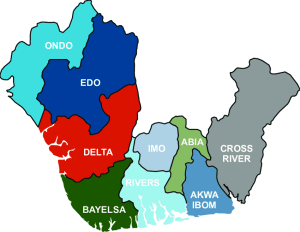Eight oil-producing states received N6.589 trillion from the Federation Account under the 13 per cent derivation principle, between 2009 and 2019, with little or no impact on the lives of citizens of the states, according to a report published by ACIOE Associates.
The report, obtained, following its release, at a webinar in Abuja, to key officers of the National Assembly and aides to the President and Minister of Niger Delta Affairs, listed the states as Abia, Akwa-Ibom, Bayelsa, Delta, Edo, Imo, Ondo and Rivers.
In the report titled: ‘Impact of the 13% Derivation Fund in the Niger Delta’, ACIOE Associates stated that in the 11-year period, Abia, Akwa Ibom, Bayelsa, Delta, and Edo states received N55.87 billion, N1.33 trillion, N1.388 trillion, N1.16 trillion and N118.85 billion respectively, while Imo, Ondo and Rivers states received N1.28 trillion, N189.277 billion and N1.057 trillion respectively.
However, the report, presented by Mrs. Funmi Adesanya, Project Lead, ACIOE Associates, noted that despite the huge fund allocated to the Niger Delta, its researchers found out that minimal access to electricity as well as absence of potable drinking water; deplorable health care facilities; and poor educational infrastructure.
The report stated that: “Most of the basic amenities that exist in the selected oil communities are provided by either joint venture partnerships between the Niger Delta Development Commission (NDDC) or Nigerian National Petroleum Corporation (NNPC) or the International Oil Companies (IOC), as part of their corporate social responsibility.
“This trend is more prevalent in states like Akwa Ibom, Bayelsa and Rivers States where the IOCs provide water, health, electricity supply and educational facilities pursuant to Global Memorandum of Understanding (GMOU) agreements between the IOCS and the respective oil producing communities in the aforementioned states.
“There is also lack of a structured framework for commissioning infrastructure projects across the communities, which has left a number of oil producing communities with little or no infrastructure.”
Speaking on the findings, Managing Director of ACIOE, Mr. Ekenem Isichei, declared that the findings of the report were corroborated by data obtained from the Office of the Accountant-General, the Nigeria Extractive Industries Transparency Initiative (NEITI), State Government Financial Statements, where possible and interviews with host community members.
Also commenting on the report, Special Assistant to the Minister of Niger Delta Affairs, Mr. Charles Achodo, called for an urgent clarification on the 13 per cent derivation principle to forestall further abuse and mismanagement of the funds to the detriment of oil-producing communities.
He said: “When 13 per cent is given, the governors share it among themselves. On the part of the Federal Government, they have done a poor job in terms of communication. It is supposed to clarify what the 13 per cent is meant for, if it is for the state or for the communities where the oil is produced from.
“The Act made it so broad; it did not specify the issue. The Act needed to be clarified, that it is not meant for the entire state, but for the oil producing communities. Taking the resources at that subsidiary level would help achieve a lot at that level.”
Vanguard






Leave a Reply